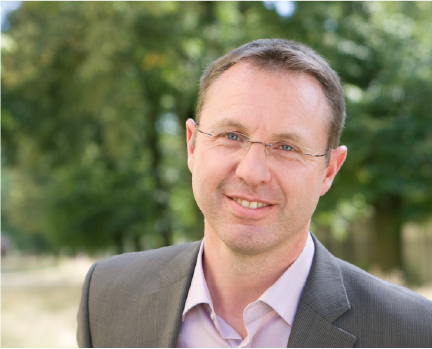Prof. Dr. Harald P. Mathis
Professor of Industrial Computer Science and Biosystems Engineering
»There is a good atmosphere for founders in NRW. We also have the largest number of universities of excellence in all the German states. This mix offers great potential«
Harald P. Mathis is a Professor of Industrial Computer Science and Biosystems Engineering. About his work at the Fraunhofer Application Center SYMLA and the special nature of North Rhine-Westphalia as a research location.

As head of the Fraunhofer Application Center SYMILA (Systems for Mobile Services and Modern Intelligent Living and Working Environments) in Hamm, you want to use your expertise to support structural change in the region. What can one imagine by such an application center and how can resident companies benefit specifically from your work?
As an application center, we are even closer to the economy than a Fraunhofer Institute or a university. We solve problems in the field of IoT (Internet of Things), software and especially AI for the economy in the region. In doing so, we have a clear focus on medium-sized businesses. Companies can come to us and talk to us about the problems they have. We offer analysis and suggestions for solving the problem. There is no cost to the company for this. If the problem solutions please them, we are happy to receive an order or a joint project with public research money.
Independently of SYMILA: How do you assess the transfer from AI research to the North Rhine-Westphalian economy in general? What is going well and what do you think needs to happen so that know-how from the institutes can be applied more quickly?
NRW supports many AI initiatives. People talk about AI everywhere and try to create an AI-friendly climate. That works very well. I think we need to approach companies even more, make it clear that AI doesn’t have to be “far away”, but is quite capable of solving many problems that can’t be solved with other methods. Above all, we should also promote projects that are carried out with and for SMEs to demonstrate the added value and to anchor AI broadly.
In addition to your work at SYMILA and a professorship at Hamm-Lippstatt University of Applied Sciences, you also founded a company yourself in North Rhine-Westphalia. What makes the federal state of NRW so special for you?
There are numerous measures to support start-ups here. I am part of the scientific advisory board of GehNUKfragen, one of the major business plan competitions in this country (in Cologne). There is a good and friendly atmosphere for start-ups in NRW. Founders will find the scientific support they need at our application center, or Fraunhofer in general, but also in the excellent network of universities and institutes. We can proudly mention that we have the largest number of universities of excellence in all the German states. A lot can be achieved with this wonderful mixture.
Prof. Dr. Harald P. Mathis studied physics, chemistry and biochemistry at Saarland University in Saarbrücken. After various positions as a research assistant, Prof. Dr. Mathis received his doctorate in biophysical chemistry from the Friedrich Schiller University in Jena in 2000. Most recently head of the department “Biomolecular Optical Systems-BioMOS in the Life Science Informatics Business Unit” at the Fraunhofer Institute for Applied Information Technology in Sankt Augustin near Bonn, he has been teaching Industrial Informatics and Biosystems Engineering at Hamm-Lippstadt University of Applied Sciences since May 1, 2010. Prof. Dr. Harald P. Mathis holds the first endowed professorship – sponsored by Stadtwerke Hamm – at Hamm-Lippstadt University of Applied Sciences. Parallel to his scientific career, Prof. Dr. Mathis co-founded several companies: in 1998 the company COMO GmbH in Jena (today Dyomics GmbH), in 2005 fluIT Biosystems GmbH, Sankt Augustin/Wendelsheim, and in 2007 DiagnostX GmbH, Dortmund.